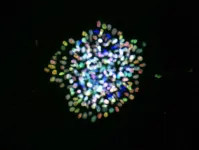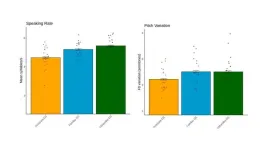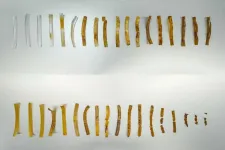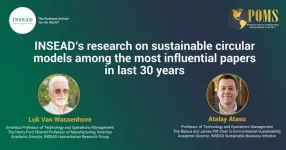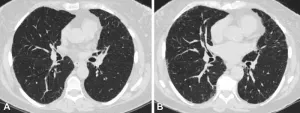(Press-News.org) The German Science and Humanities Council (Science Council) assessed the German Fed-eral Institute for Risk Assessment (BfR) in Berlin on 7 and 8 November 2023 and published its assessment today, 22 April 2024. As the highest German scientific commission, it certi-fies that the BfR “fulfills tasks of great social relevance” (protection of human health, in-forming the public about health risks posed by chemicals and biological substances) “on the basis of very good research”. It is characterised by an “extremely rapid response capability, a pronounced application orientation and a high degree of being up-to-date with its topics”. “We are delighted with the excellent result of the assessment,” commented BfR President Professor Andreas Hensel. “It is a recognition of the fact that we have been able to further improve the quality of our work in recent years.”
Link to the report of the German Science and Humanities Council:
https://www.wissenschaftsrat.de/download/2024/1821-24.html
From toys and cosmetics to the protection of laboratory animals: The BfR's areas of respon-sibility are diverse. Since its foundation, the Institute has focussed on the health risk assess-ment of food, animal feed, plant protection products, chemicals and products. To this end, it utilises a research-based approach. The focus is always on the protection of human health. The BfR's legal mandate also includes communication on possible, identified and assessed risks in the area of consumer health protection. To ensure that the assessments are not in-fluenced by political, economic and social interests, the BfR is independent in its scientific assessments and research in accordance with the German Founding Act.
The BfR fulfils its statutory tasks such as analysis, method development and quality assur-ance for the risk assessment of chemical and biological substances “in an outstanding man-ner”, summarises the Science Council. In this way, the Institute also makes a “significant con-tribution to communicating and ensuring appropriate quality standards” internationally. The BfR provides comprehensive advice to policy-makers, practitioners and associations both nationally and internationally and is “very well integrated” into political bodies and decision-making processes. The scientific independence of the Institute is a key prerequisite for this.
Social science research strengthened
Since the last assessment in 2015, the BfR “has further improved its performance”, the Ger-man Council of Science and Humanities states. The quality of research is “predominantly very good”. The Risk Communication Department in particular has benefited from the “strength-ening of social science risk research”. The Department of Biological Safety is particularly strong in research. It provides “outstanding research services on microbiology and other food-borne infections”.
Development of animal-free methods
The Science Council also praises the development of animal-free methods of risk assessment, which the German Centre for the Protection of Laboratory Animals (Bf3R) at the BfR is in-volved in. The internationally visible commitment to the regulation of animal experiments is “very positive”.
“Very good” publication performance
The BfR's scientific publication performance is “good overall, in some areas very good”, is the verdict of the German Council of Science and Humanities. In publications for non-scientific target groups, highly topical issues with great relevance to everyday life are addressed and existing uncertainties and gaps in knowledge are also communicated convincingly.
Since the last evaluation, the BfR has more than doubled the amount of funding it has re-ceived (third-party funding). Measured against the ratio of research and consultancy at the BfR, the third-party funding performance is “very good”. As a significant proportion of the funding comes from the European Union (EU) or the European Food Safety Authority (EFSA), this speaks in favour of the BfR’s excellent integration at the European level.
Of global importance for risk assessment
“The BfR is very well networked both nationally and internationally,” the Science Council states. Cooperation with other research institutions should be further expanded. The BfR’s role is indispensable for Germany, especially in toxicology. As one of the world's largest risk assessment authorities, the BfR also plays an enormously important role globally. It fulfils its great international responsibility very well in many areas.
A very committed Scientific Advisory Board contributes to the fact that quality assurance at the BfR is “outstanding”, comments the German Council of Science and Humanities. Its sug-gestions are “accepted and implemented with great openness”. The regular assessment of individual BfR departments by the Advisory Board is particularly welcome.
Focus on young scientists
Since the previous assessment by the German Council of Science and Humanities, the BfR has established junior research groups. They strengthen independence at the start of a ca-reer and also make a significant contribution to the BfR’s research performance, emphasises the Science Council. In addition, there is a further training programme for doctoral students, the doctoral support programme. The Council of Science and Humanities recommends that the promotion of young scientists be further expanded.
“The BfR has very motivated and highly qualified employees who identify in a special way with the BfR’s goal of protecting human health,” concludes the Science Council.
About the BfR
The German Federal Institute for Risk Assessment (BfR) is a scientifically independent institution within the portfolio of the Federal Ministry for Food and Agriculture (BMEL). The BfR advises the Federal Government and the Federal States on questions of food, chemicals and product safety. The BfR conducts independent research on topics that are closely linked to its assessment tasks.
END
Science council: “Tasks excellently fulfilled”
Focus on consumer health protection: Germany's highest scientific commission scrutinises the Ger-man Federal Institute for Risk Assessment (BfR)
2024-04-30
ELSE PRESS RELEASES FROM THIS DATE:
USC-led study introduces a new and improved way to grow the cells that give rise to the kidney’s filtration system
2024-04-30
In a new study published in Cell Stem Cell, USC scientists report significant progress in cultivating nephron progenitor cells (NPCs), the cells destined to form the kidney’s filtration system, the nephrons. NPCs hold immense promise for understanding kidney development, modeling diseases, and discovering new treatments.
“By enhancing our capability to grow NPCs from human stem cells, we create a new avenue for understanding and combating congenital kidney diseases and cancer,” said corresponding and lead author Zhongwei Li, an assistant professor of medicine, and stem cell biology and regenerative medicine ...
USPSTF recommendation statement on screening for breast cancer
2024-04-30
Bottom Line: The U.S. Preventive Services Task Force (USPSTF) recommends biennial screening mammography for women ages 40 to 74. The USPSTF concludes that the current evidence is insufficient to assess the balance of benefits and harms of screening mammography in women 75 years or older. The USPSTF concludes that the current evidence is insufficient to assess the balance of benefits and harms of supplemental screening for breast cancer using breast ultrasonography or magnetic resonance imaging (MRI) in women identified to have dense breasts on an otherwise negative screening mammogram. Among ...
Machine listening: Making speech recognition systems more inclusive
2024-04-30
WASHINGTON, April 30, 2024 – Interactions with voice technology, such as Amazon’s Alexa, Apple’s Siri, and Google Assistant, can make life easier by increasing efficiency and productivity. However, errors in generating and understanding speech during interactions are common. When using these devices, speakers often style-shift their speech from their normal patterns into a louder and slower register, called technology-directed speech.
Research on technology-directed speech typically focuses on mainstream varieties of U.S. English without considering speaker groups that are more consistently ...
Biodegradable ‘living plastic’ houses bacterial spores that help it break down
2024-04-30
A new type of bioplastic could help reduce the plastic industry’s environmental footprint. Researchers led by the University of California San Diego have developed a biodegradable form of thermoplastic polyurethane (TPU), a soft yet durable commercial plastic used in footwear, floor mats, cushions and memory foam. It is filled with bacterial spores that, when exposed to nutrients present in compost, germinate and break down the material at the end of its life cycle.
The work is detailed in a paper published on April 30 in Nature Communications.
The biodegradable TPU was made with ...
Loneliness grows as we age
2024-04-30
Adults are lonelier in early and older adulthood, less lonely in middle adulthood
Consistent loneliness pattern found across nine longitudinal studies, all collected prior to COVID-19 pandemic
CHICAGO --- Loneliness in adulthood follows a U-shaped pattern: it’s higher in younger and older adulthood, and lowest during middle adulthood, reports a new Northwestern Medicine study that examined nine longitudinal studies from around the world.
The study also identified several risk factors for heightened loneliness across the whole lifespan, including ...
Listening to mindfulness audios during radiation improves physical, emotional side effects
2024-04-30
It’s a ‘twofer’: Helping men manage side effects, receive cancer treatment at same time
Men with cancer rarely participate in oncology supportive care: ‘You build it, and they don’t come’
First study to deliver mindfulness during radiation therapy while patients were ‘a captive audience’
CHICAGO --- Men with prostate cancer who are treated with radiation therapy experience significant side effects such as fatigue, sleep problems, anxiety and depressive symptoms. But listening to mindfulness audio recordings significantly eased those symptoms, a new Northwestern ...
INSEAD’s research on sustainable circular models among the most influential papers in last 30 years
2024-04-30
Studies by INSEAD Professors Atalay Atasu and Luk Van Wassenhove have been recognised by members of the Product Operations Management Society for their impact.
Their papers are named among the top 10 most influential papers published in the first 30 years of the Production and Operations Management (POM) journal. They were voted for by POM society members based on an original list of 150 of the most cited papers since the publications launch in 1992.
Emeritus Professor Van Wassenhove is a co-author of two papers that made the top 10. His 2005 paper, “Sustainable Operations Management” looked at ...
Quitting smoking during pregnancy may have a positive effect on placental weight
2024-04-30
The researchers in Bergen and Exeter used data from the Norwegian Mother, Father and Child Cohort Study (MoBa) and a similar study in the UK, the Avon Longitudinal Study of Parents and Children (ALSPAC), to investigate the relationship between smoking and placental weight. The aim was to determine to what extent expectant mothers who quit smoking could impact the weight of the placenta at the time of birth.
The study was recently published in the journal BMC Pregnancy and Childbirth.
Previous research has demonstrated ...
GPT-4, Google Gemini fall short in breast imaging classification
2024-04-30
OAK BROOK, Ill. – Use of publicly available large language models (LLMs) resulted in changes in breast imaging reports classification that could have a negative effect on patient management, according to a new international study published today in the journal Radiology, a journal of the Radiological Society of North America (RSNA). The study findings underscore the need to regulate these LLMs in scenarios that require high-level medical reasoning, researchers said.
LLMs are a type of artificial intelligence (AI) widely used today for a variety of purposes. In radiology, LLMs have already been tested in ...
Lung abnormality progression linked to acute respiratory disease in smokers
2024-04-30
OAK BROOK, Ill. – Smokers who have small abnormalities on their CT scans that grow over time have a greater likelihood of experiencing acute respiratory disease events, according to a new study published today in Radiology, a journal of the Radiological Society of North America (RSNA).
Quantitative interstitial abnormalities (QIA) are subtle abnormalities on chest CTs that do not meet the diagnostic criteria for advanced pulmonary diseases but are nonetheless associated with decreased ...
LAST 30 PRESS RELEASES:
New data on spontaneous coronary artery dissection (SCAD) – a common cause of heart attacks in younger women
How root growth is stimulated by nitrate: Researchers decipher signalling chain
Scientists reveal our best- and worst-case scenarios for a warming Antarctica
Cleaner fish show intelligence typical of mammals
AABNet and partners launch landmark guide on the conservation of African livestock genetic resources and sustainable breeding strategies
Produce hydrogen and oxygen simultaneously from a single atom! Achieve carbon neutrality with an 'All-in-one' single-atom water electrolysis catalyst
Sleep loss linked to higher atrial fibrillation risk in working-age adults
Visible light-driven deracemization of α-aryl ketones synergistically catalyzed by thiophenols and chiral phosphoric acid
Most AI bots lack basic safety disclosures, study finds
How competitive gaming on discord fosters social connections
CU Anschutz School of Medicine receives best ranking in NIH funding in 20 years
Mayo Clinic opens patient information office in Cayman Islands
Phonon lasers unlock ultrabroadband acoustic frequency combs
Babies with an increased likelihood of autism may struggle to settle into deep, restorative sleep, according to a new study from the University of East Anglia.
National Reactor Innovation Center opens Molten Salt Thermophysical Examination Capability at INL
International Progressive MS Alliance awards €6.9 million to three studies researching therapies to address common symptoms of progressive MS
Can your soil’s color predict its health?
Biochar nanomaterials could transform medicine, energy, and climate solutions
Turning waste into power: scientists convert discarded phone batteries and industrial lignin into high-performance sodium battery materials
PhD student maps mysterious upper atmosphere of Uranus for the first time
Idaho National Laboratory to accelerate nuclear energy deployment with NVIDIA AI through the Genesis Mission
Blood test could help guide treatment decisions in germ cell tumors
New ‘scimitar-crested’ Spinosaurus species discovered in the central Sahara
“Cyborg” pancreatic organoids can monitor the maturation of islet cells
Technique to extract concepts from AI models can help steer and monitor model outputs
Study clarifies the cancer genome in domestic cats
Crested Spinosaurus fossil was aquatic, but lived 1,000 kilometers from the Tethys Sea
MULTI-evolve: Rapid evolution of complex multi-mutant proteins
A new method to steer AI output uncovers vulnerabilities and potential improvements
Why some objects in space look like snowmen
[Press-News.org] Science council: “Tasks excellently fulfilled”Focus on consumer health protection: Germany's highest scientific commission scrutinises the Ger-man Federal Institute for Risk Assessment (BfR)
